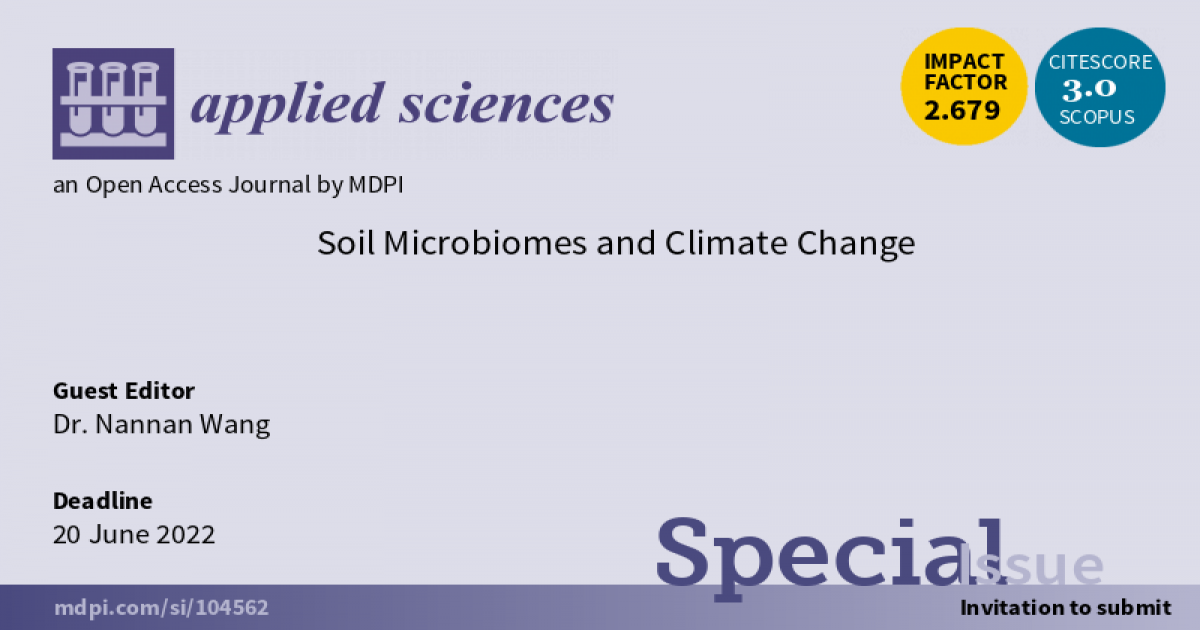Soil Microbiomes and Climate Change
A special issue of Applied Sciences (ISSN 2076-3417). This special issue belongs to the section "Environmental Sciences".
Deadline for manuscript submissions: closed (20 June 2022) | Viewed by 276

Special Issue Editor
Special Issue Information
Dear Colleagues,
The ongoing global climate change caused by greenhouse gas increase represents one of the biggest political challenges of the 21st century. As soil microorganisms are largely responsible for the cycling of soil organic carbon (SOC) and other nutrients, they have a key role in climate feedback, including the production or consumption of greenhouse gases. The continuing climate change, with weather patterns which are becoming more erratic and extreme, is introducing more extended and higher extremes of change with unknown consequences on the stability and resilience of the soil microbiome. Therefore, a better understanding of microbial traits that confer ecosystem resilience to climate change is needed for predicting and managing ecosystem responses to climate change.
This Special Issue invites authors to share their research outcomes on soil microbiomes under global climate change. Soil microbiomes refer to soil with an interacting community of bacteria, archaea, fungi, viruses, and protozoa. Anticipated climate change might include elevated levels of atmospheric carbon dioxide (eCO2), elevated temperature, increased precipitation, increased drought, and increased fire frequency. Crucial topics of interest include how climate change influences both the taxonomic composition of soil microbial communities and the key functions achieved by determining the details of biochemical pathways, such as those involved in soil respiration and methane emission.
Dr. Nannan Wang
Guest Editor
Manuscript Submission Information
Manuscripts should be submitted online at www.mdpi.com by registering and logging in to this website. Once you are registered, click here to go to the submission form. Manuscripts can be submitted until the deadline. All submissions that pass pre-check are peer-reviewed. Accepted papers will be published continuously in the journal (as soon as accepted) and will be listed together on the special issue website. Research articles, review articles as well as short communications are invited. For planned papers, a title and short abstract (about 100 words) can be sent to the Editorial Office for announcement on this website.
Submitted manuscripts should not have been published previously, nor be under consideration for publication elsewhere (except conference proceedings papers). All manuscripts are thoroughly refereed through a single-blind peer-review process. A guide for authors and other relevant information for submission of manuscripts is available on the Instructions for Authors page. Applied Sciences is an international peer-reviewed open access semimonthly journal published by MDPI.
Please visit the Instructions for Authors page before submitting a manuscript. The Article Processing Charge (APC) for publication in this open access journal is 2400 CHF (Swiss Francs). Submitted papers should be well formatted and use good English. Authors may use MDPI's English editing service prior to publication or during author revisions.
Benefits of Publishing in a Special Issue
- Ease of navigation: Grouping papers by topic helps scholars navigate broad scope journals more efficiently.
- Greater discoverability: Special Issues support the reach and impact of scientific research. Articles in Special Issues are more discoverable and cited more frequently.
- Expansion of research network: Special Issues facilitate connections among authors, fostering scientific collaborations.
- External promotion: Articles in Special Issues are often promoted through the journal's social media, increasing their visibility.
- e-Book format: Special Issues with more than 10 articles can be published as dedicated e-books, ensuring wide and rapid dissemination.
Further information on MDPI's Special Issue policies can be found here.





